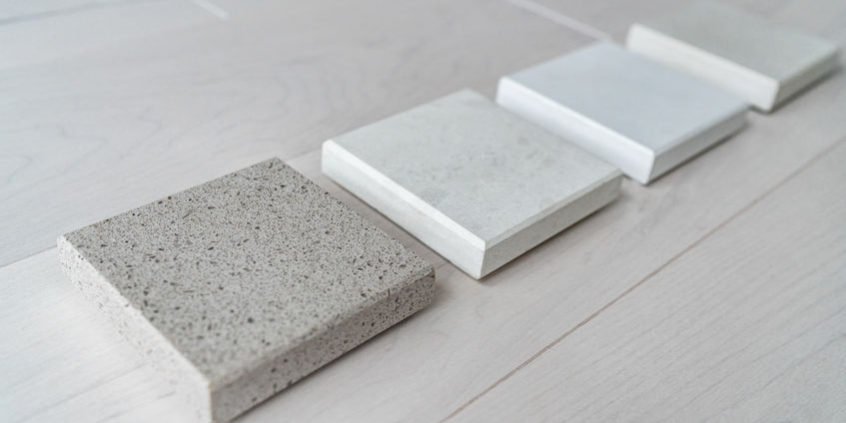Homeowners are increasingly concerned with eco-friendliness in their construction and renovation projects. This might mean using reclaimed or upcycled materials and low toxicity paints or looking at installing energy efficient systems like solar panels or low-flow faucets. Did you know that your countertops can be eco-friendly as well? Quartz is an engineered stone that offers among its benefits lower environmental impact than natural stones. Let’s take a closer look at this gorgeous, durable, and highly flexible material.
What is quartz?
Quartz is engineered stone, meaning that while it is, indeed, made of natural stone—including the mineral quartz—it is not a slab mined from a quarry. Instead, quartz is made by mixing stone elements (around 90%) with resins, polymers, and pigments. In this way, it is manufactured and can be produced to mimic the natural veining and patterns of quarried stone slabs. It can also be given more unique colours and textures, as desired by the consumer.
How is quartz eco-friendly?
Three main things contribute to quartz’ eco-friendliness:
- Like other natural resources, quarried stone is finite. It takes millions of years for stones to form. When a slab of granite or marble is cut from the earth, it cannot be replaced. Quartz is not quarried.
- Many of the natural stone elements in quartz countertops are actually reclaimed by-products from the quarrying process itself—stone that would have otherwise gone to waste. No stone is quarried solely for use in quartz countertops. The same goes for many of the resins. They are salvaged from the manufacture of other stone.
- As an engineered product, quartz can be made regionally. If you think about the resources used in transporting slabs of granite or marble, you get an idea of how much more environmentally friendly quartz is.
Is quartz as good as quarried stone?
Quartz can be manufactured to look very much like stone including the veins, colours, and patterns found in nature. Unlike quarried stone, however, quartz can receive special treatments to produce unusual or custom effects and colours.
As an engineered product, quartz is flexible. It can be customized for your space without seams. It’s also extremely durable. It’s heat- and stain-resistant, and non-porous surface resists cracks and scratches. Unlike natural stone, it doesn’t require annual sealing.
Which quartz is the best for my countertops?
With so many colours and patterns to choose from, the answer to this question will depend largely on personal taste. From an environmentally conscious perspective, though, our premium ST quartz, designed and fabricated close by in Woodstock, Ontario, is very popular. We recommend taking a look at the ST White galaxy, ST Black galaxy, and the ST Super white—all three contain glass in the mix.
With all the many decisions to be made during a home construction or renovation project, environmental friendliness may not be at the top of your list. Along with customizability, durability, and great looks, quartz countertops offer an option that’s as good for the planet as it is for you.








